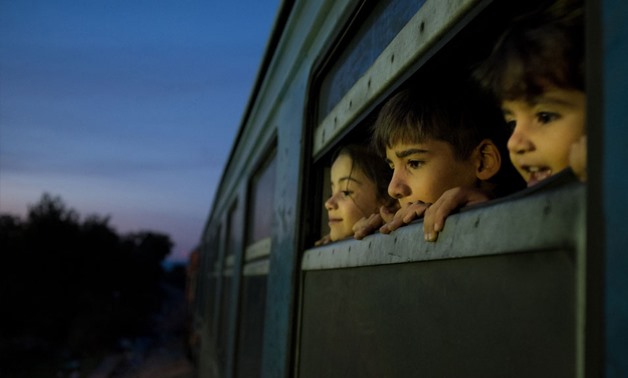
Three children look out of the window of a train, which was boarded by refugees primarily from Syria, Afghanistan and Iraq - Photo UNICEF - Ashley Gilbertson
CAIRO – 10 July 2017: The United Nations High Commissioner for Refugees (UNHCR), the United Nations Children Fund (UNICEF), the International Rescue Committee (IRC) and their partners issued on Monday the ‘Way Forward’ roadmap that includes a set of recommendations for action to improve the situation of separated refugee and migrant children arriving and staying in Europe.
The roadmap highlights the need to identify children that are not accompanied by their parents or caregivers, register them through child-friendly procedures and build a relationship of trust with them as easily as possible. It was developed in a consultative approach with input from 100 individuals including guardians, psychologists, social workers and lawyers, as well as relevant authorities from several European states and the European Union (EU) and refugee and migrant children across the continent.
Findings from the consultation activities highlighted that the available legal framework for child protection in many countries is complex, costly, and does not take into account the best interest of separated children leading to severe consequences for their well-being and their future.
As outlined in the roadmap, efficient and harmonized processes support children to understand procedures and access protection and solutions in accordance with their best interests. It also emphasizes the vital role of well-trained guardians in taking immediate responsibility for the child, engaging cultural mediators and mobilizing members of host communities to build a trusting relationship and protect children from smugglers, traffickers or family pressure.
Two children who participated in the road map consultation process said respectively, “An organized procedure is needed that first tells us our rights and opportunities. Currently we are afraid to ask for accommodation,” and “Include the opinion and desire of the child in the preparation of the plan for him … to follow his interests and desires.”
In a joint statement on Monday, UNICEF Deputy Director for Europe and Central Asia David McLoughlin said, “Refugee and migrant children travelling alone to Europe have taken paths marked by danger, bureaucratic backlogs and uncertainty at every step of the way – even at their destination.”
He added, “This roadmap plots the way forward for these children to be given the same level of care, trust and protection as national children.”
In addition, Deputy Director of UNHCR's Europe Bureau Diane Goodman said, “They deserve better protection and care from Europe… The roadmap shows us how.”
The situation for unaccompanied and separated refugee and migrant children has worsened since the increase of arrivals to Europe back in 2015, with a broadened use of detention and large scale institutional care, limited family reunification opportunities and rising concerns over deportations.
Many of these children have experienced violence, sexual exploitation, rape, trafficking, forced marriage and/or severe emotional and psychological pressure not only during their journey but also once in Europe.
According to the ‘Way Forward’ roadmap, Europe can turn this challenging situation into an opportunity to move away from a fragmented and often harmful approach to the children’s needs which will have severe long-term effects on both the children and European societies overall. Alternatively, Europe can establish stronger systems that will better protect all children and set a positive example for other countries.


Comments
Leave a Comment